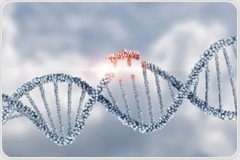
|
|
|
| |

|
|
| |
The latest genomics news from News Medical |
|
|
|
 | | |
 Empowering genomics research with cloud-based innovation Empowering genomics research with cloud-based innovation
Discovery Life Sciences is accelerating genomics innovation by adopting DNAnexus’ powerful cloud platform. This collaboration streamlines data integration across global labs, enhances real-time analysis, and supports precision medicine breakthroughs. Learn how this strategic move is helping scale operations and drive faster, more secure genomic insights for research and diagnostics.
| |
|
|
|
|
 | | |  In a revealing Genomic Press Interview published today in Genomic Psychiatry, Dr. Maria Margarita Behrens recounts an extraordinary scientific journey that wound through four countries and multiple disciplines before arriving at fundamental questions about how the brain develops and what goes wrong in psychiatric disorders. In a revealing Genomic Press Interview published today in Genomic Psychiatry, Dr. Maria Margarita Behrens recounts an extraordinary scientific journey that wound through four countries and multiple disciplines before arriving at fundamental questions about how the brain develops and what goes wrong in psychiatric disorders. | | | | |  Scientists have recovered a genome of Treponema pallidum – the bacterium whose subspecies today are responsible for four treponemal diseases, including syphilis – from 5,500-year-old human remains in Sabana de Bogotá, Colombia. Scientists have recovered a genome of Treponema pallidum – the bacterium whose subspecies today are responsible for four treponemal diseases, including syphilis – from 5,500-year-old human remains in Sabana de Bogotá, Colombia. | | | | |  DNA–protein cross-links (DPCs) represent a severe form of DNA damage that can disrupt essential chromatin-based processes. Among them, DNA–histone cross-links (DHCs) occur frequently within nucleosomes, yet their structural and functional consequences remain poorly understood due to their instability and low natural abundance. DNA–protein cross-links (DPCs) represent a severe form of DNA damage that can disrupt essential chromatin-based processes. Among them, DNA–histone cross-links (DHCs) occur frequently within nucleosomes, yet their structural and functional consequences remain poorly understood due to their instability and low natural abundance. | | | | |  What keeps our cells the right size? Scientists have long puzzled over this fundamental question, since cells that are too large or too small are linked to many diseases. Until now, the genetic basis behind cell size has largely been a mystery. What keeps our cells the right size? Scientists have long puzzled over this fundamental question, since cells that are too large or too small are linked to many diseases. Until now, the genetic basis behind cell size has largely been a mystery. | | | | |  Viruses are everywhere in wastewater treatment plants, quietly interacting with bacteria as sewage is cleaned and reused. Viruses are everywhere in wastewater treatment plants, quietly interacting with bacteria as sewage is cleaned and reused. | |
|
|
|
 | | | How would you rate today's newsletter?
| |
|
|
|
 | | |
 |
Stay updated with the latest in health and medical news! Follow News‑Medical.net on Google News for real‑time updates. Click here to follow us now. |
| |
|
|
|
|
|